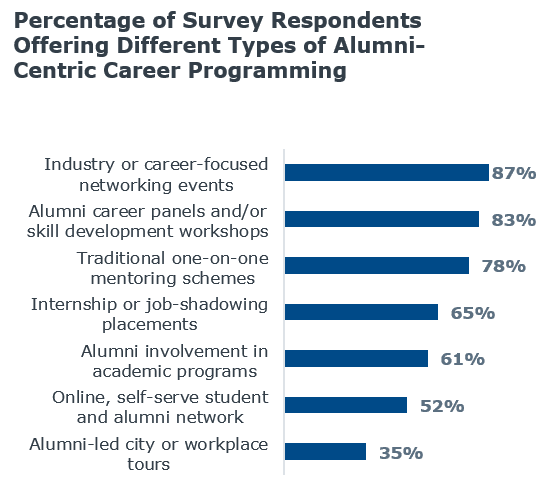Deepening Alumni-Student Relationships to Create Two-Way Value
About this brief
This report profiles strategies deployed by UK, US, and Canadian higher education institutions to leverage alumni to improve student skills and gradate outcomes. The introduction below frames the case studies using data from an EAB survey of UK alumni relations and career services leaders. The strategies that follow span four broad topic areas for better leveraging alumni-student relationships in the interests of employability.
Introduction: Great expectations – and opportunities – for student employability
Perhaps like never before, higher education institutions are under pressure to deliver on a promise of graduate employability. In the UK, new requirements from the Office for Students’ regulatory framework, coupled with growing public concern about the return on investment associated with higher education, have reignited expectations about students’ post-graduate outcomes. As seen in the data on the right, underemployment of university graduates in the UK continues to pose difficult questions about value for money.
26%
31%
Thankfully, institutions have many (albeit under-utilised) resources at their disposal to move the dial on student employability. One such solution is to leverage alumni to enhance student career development in a mutually beneficial relationship. The reasoning is simple: Students require access to employers, insight into various industries, and guidance on how to search for jobs and network. Alumni seek volunteer opportunities for their own professional development, a chance to strengthen their personal networks with academic staff, and venues to give back to students.
The university sits at the centre of this relationship and is well-primed to serve as the intermediary between students and alumni through programming and events. Facilitating relationships between students and alumni meets two institutional priorities: combatting student employability issues, and engaging alumni.
Students' career preparation needs


Alumni resources for student career preparation


Most institutions—around 90% of the UK institutions EAB surveyed as part of this research—have programming that engages alumni in student career development. The list to the right shows the frequency with which surveyed institutions offer a range of typical programmes to leverage alumni to meet student needs. Most commonly, institutions focus on networking events. Least commonly, only 35% of respondents offer alumni-led city or workplace tours.
The frequency of these activities masks an underlying worry among surveyed institutions—namely that programming is not doing enough to meet the pace of student expectations, particularly as workforce needs and employer habits evolve.
"Our career readiness programs are doing okay…but we really don't know their impact."
"Alumni relations is not understood, and it is definitely under-resourced."
"You can have the best programmes in the world, but they're useless if we can't get people to participate."
Without knowing what problems stand in the way of students’ career development, university leaders struggle to ascertain the best type of programming to offer students. After speaking with dozens of alumni and career services professionals in the UK and Ireland, EAB has uncovered four problems encountered by students, alumni, and university staff when it comes to engaging alumni in student employability initiatives.
Problem #1: Students unaware of the full range of career options
75+%
46%
First, students do not always understand the full range of opportunities available to them upon graduation. In the US, for example, three quarters of recent graduates do not know the full range of relevant employment opportunities, and almost half are unaware about what they can do with their degrees.
Lacking knowledge of appropriate career opportunities, students are stuck searching in the wrong places or applying to the wrong jobs. Alumni are the perfect resource to spotlight the variety of career options available to students, based on their own career trajectories.
“About one in three graduates end up being ‘mismatched’ to the jobs they find after leaving university… These mismatched graduates face poorer prospects and lower earnings than their peers who embark on careers that are a better fit for the knowledge and skills they have acquired through three or four years of study. It suggests that traditional careers advice isn’t working.”
– Sarah Steed, “Too many graduates are mismatched to their jobs. What’s going wrong?” The Guardian, 25 January 2018
Problem #2: Students need workplace experience before graduation
49%
Today’s students know that employers want graduates with basic workplace skills and business etiquette. Students are therefore demanding work experiences from their universities but become frustrated with their institutions failing to meet this demand in a meaningful way. They often struggle to find opportunities to work during their degree programme. In fact, only half of students who say they want access to work experience, placements, or internships, actually undertake one. Again, alumni are a natural resource to help students gain workplace experience through internships or job-shadowing.
Employers increasingly demand graduates have workplace experience, but universities are not keeping up with demands
93%
47%
25%
Problem #3: Ensuring student-alumni connections often falls through the cracks
Complicating the above problems, universities often lack clear leadership and coordination about alumni engagement. Alumni relations teams are excluded from career preparedness conversations despite their natural position as a leader in connecting students and alumni. They have access to a robust alumni network and alumni employment data, and they understand the most effective ways to engage alumni to volunteer. Yet despite all of this potential, siloed campus operations too often get in the way. Almost half of surveyed UK alumni leaders report that they do not collaborate with any other campus units in executing on their strategies, eliminating the possibility of sharing information and best practices across the institution, or collaborating on innovative programming.
Alumni relations has potential to enhance student employability

But efforts often flounder due to siloed campus operations. Forty-eight percent of UK alumni leaders surveyed by EAB don’t collaborate with other campus units.
Problem #4: Student and alumni participation equally difficult to secure
Even the most innovative student-alumni career programmes are ineffective if neither stakeholder participates. Participants in EAB’s survey of UK institutions report, on average, a 50% drop-off rate from students who register for events compared to those who actually attend. This has a multiplying effect on alumni, who become frustrated and disengaged when their time is not respected.
50%
Engaging alumni has a different set of challenges. Universities often deploy a scattershot approach of appealing to a wide swath of professionals to participate in their programmes. If the needs and interests of students and alumni are not carefully aligned, both parties may find themselves disappointed with the outcomes.
From problems to solutions
Higher education institutions have been addressing the problems above with a range of innovative strategies. Read on and click the links below to learn about the 12 strategies that UK, US, and Canadian institutions are pursuing, and consider which are most relevant to your institution.
Solution 1: Driving student employment through career exploration
Students need opportunities to explore the variety of career opportunities available to them after completing their degrees. Without knowing what jobs are in the market and how to meet professionals working in those industries, students can remain in the dark about career prospects.
| Challenge | Strategy | |
| 1 | Students unaware of the multitude of careers available to them with their degrees | “This could be YOU!” career showcases |
| 2 | Students lack opportunities to network with professionals and gain deeper insight into various industries | Developing impactful networking engagements |
| 3 | Alumni relations officers are unsure how to differentiate and maximise the potential of mentoring schemes | Choosing the right mentoring scheme |
Solution 2: Instilling employable skills in students through alumni expertise
Beyond struggling with career exploration, recent graduates’ employment prospects may be limited by a lack of critical skills, from resume-building and interviewing to hands-on project management experience.
| Challenge | Strategy | |
| 1 | Students lack skills critical to success in the workplace, including resume building, networking, interviewing, and business etiquette | Equipping students with career readiness skills |
| 2 | Curricula in industry-focused disciplines often lack workplace insight, given academic staff’s distance from emerging trends | Leavening the curriculum with real-world experiences |
| 3 | Students lack exposure to hands-on workplace experience, making it difficult to land first jobs or internships | Facilitating workplace experience |
Solution 3: Elevating the role of alumni relations in student employability activities
To maximise the efficiency, success, and impact of programming to connect alumni with students, campus units need to break down historical silos. Alumni relations is well-primed to serve as a campus champion for engaging alumni into student career outcomes, but several hurdles may stand in the way. Campus stakeholders often misunderstand the role of alumni relations, trying to avoid ‘interference’ by alumni relations, or fearing that alumni will be hounded for money. Excluding alumni relations from this conversation leads to less impactful engagement efforts and is a missed opportunity for alumni relations to provide academic leaders with best practice advice and support.
| Challenge | Strategy | |
| 1 | No campus champion for bringing alumni into student career outcomes initiatives | Raising the profile of alumni relations |
| 2 | Universities unable to take full advantage of alumni impact | Engaging academic staff in support activities |
| 3 | Organisational silos increase the difficulty of collaborating between alumni relations, career services, and other campus players who engage alumni | Developing cross-campus partnerships |
Solution 4: Maximising impact through targeted recruitment and assessment
Three major organisational impediments challenge the success of institutions’ alumni-student employability programming. First, students may not attend events, often a product of being either unaware or uninterested. Second, while alumni tend to be eager to volunteer, institutions struggle to engaging the right types of alumni in its programmes, resulting in recruiting alumni with the wrong skill set or background for particular initiatives. Finally, institutions struggle to assess program success, making it difficult to prioritise and communicate what works.
| Challenge | Strategy | |
| 1 | Students don’t show up, as they are unaware of or uninterested in the programming available to improve their employability | Boosting student participation |
| 2 | Alumni don’t show up, a product of scattershot asks and unclear volunteer opportunities that lead to the wrong types of alumni volunteers | Recruiting best-fit alumni to the right programs |
| 3 | Programmes remain unevaluated, undercutting efforts to advocate for more resources for highly engaging activities | Evaluating and communicating impact |
Sources: 1) “What do graduates do?” Prospects, 2018/19 (the full report with the data is downloadable at the link); 2) Office for National Statistics, “One in three graduates overeducated for their current role,”29 April 2019; 3) EAB’s UK Alumni Career Engagement Survey: Views from Heads of Alumni Relations at Leading UK Universities; N=23; 4) Robert J LaBombard, “‘I don’t know what to do with my major’ and other reasons college grads can’t find good jobs,” CNBC, 15 December 2016; 5) Robert J LaBombard, “‘I don’t know what to do with my major’ and other reasons college grads can’t find good jobs,” CNBC, 15 December 2016; 6) G Bailey “A-level results: Employers favour work experience and apprenticeships over degrees, claims poll,” The Independent, 14 August 2018; 7) National Centre for Universities and Business, Student Employability Index 2014; http://www.ncub.co.uk/reports/student-employability-index-2014.html; 8) National Centre for Universities and Business, Student Employability Index 2014; http://www.ncub.co.uk/reports/student-employability-index-2014.html; 9) National Centre for Universities and Business, Student Employability Index 2014; http://www.ncub.co.uk/reports/student-employability-index-2014.html; 10) EAB’s UK Alumni Career Engagement Survey: Views from Heads of Alumni Relations at Leading UK Universities; N=23; 11) EAB’s UK Alumni Career Engagement Survey: Views from Heads of Alumni Relations at Leading UK Universities; N=23
Resource Centre
This resource requires EAB partnership access to view.
Access the research report
Learn how you can get access to this resource as well as hands-on support from our experts through Professional and Academic Services Forum.
Learn More